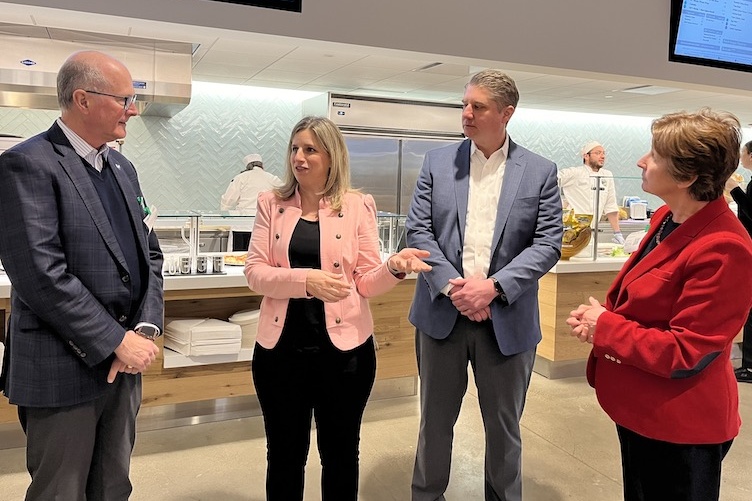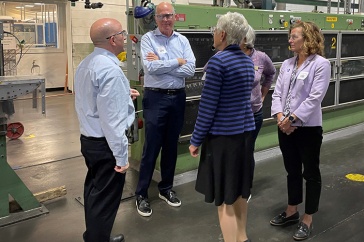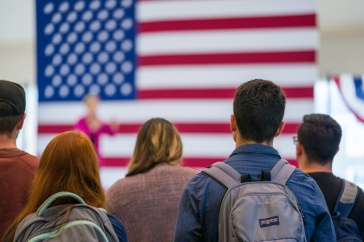
UNH President James W. Dean, Jr. (left) is flanked by Amy Branson, director of the regional leadership office for Fidelity, Sean Howell, co-site leader for Fidelity's Merrimack Regional Center, and Michele Dillon, dean of UNH's College of Liberal Arts, during a recent visit by UNH leadership to Fidelity's Merrimack campus.
In 2018, as the newly appointed leader of the University of New Hampshire, President Jim Dean’s first official business visit was to Fidelity Investment’s Merrimack, New Hampshire campus. Last week, Dean returned with a contingent of UNH colleagues, eager to see how the university's partnership with the privately held financial services firm has evolved over the past six years and how it can better serve both institutions in the years to come.
“This is a really important relationship to us,” Dean says. “From hiring our graduates to supporting our business initiatives."
The visit was the latest in UNH’s “Embrace New Hampshire” event series, demonstrating the university’s commitment to the state’s economy, workforce and quality of life. Dean was joined by Marian McCord, senior vice provost for research, economic engagement and outreach, College of Liberal Arts Dean Michele Dillon, and Gretchen Heaton, associate vice provost, Career and Professional Success, among others.
The visit began in Fidelity’s Fixed Income unit with a brief tour led by Tressa Webb ’98, head of investment services for the fixed income division. Webb walked the group through the trading floor, where over 200 associates manage more than $1.9 trillion in customer assets.
Later, Dean and the UNH representatives met with Fidelity’s regional leadership team to learn more about the company’s workforce. Fidelity hires more UNH students for internships and first jobs than any other company in New Hampshire; last year 49 UNH graduates landed their first job at Fidelity, including 18 who had interned at the company prior.
“Our first strategic priority is student success,” Dean told the group. “That starts with making sure our students get a good education, and their experience at UNH supports the positions they take when they leave.”
Though they are known as a financial services firm, Fidelity hires students from all UNH schools into a variety of roles, including as customer relationship advocates, technologists, business analysts and fund operations roles. The UNH delegation heard presentations from a number of alumni on their careers at Fidelity and how their college educations had helped them prepare.
Brooke Spicer ’15 originally applied to Fidelity because she’d heard good things about the company culture from friends who worked there. A graduate of the College of Liberal Arts, she had a background in hospitality and now works as a regional center talent champion. “We want people who are able to build relationships,” she says.
Seeing how students build upon their UNH experiences was both rewarding and informative, Dillon says.
“It’s always enriching for me to meet with alumni in their work settings and to hear about their trajectory,” she says. “It gives me grounded information that I can convey when I’m talking with current and prospective students – and parents – about the career paths available to Liberal Arts majors.”
Karina Popkova ’17, a graduate of the Peter T. Paul College of Business and Economics, started out thinking she wanted to go into finance. Her undergraduate experience with business fraternity Alpha Kappa Psi showed her how to communicate with stakeholders, and a Fidelity professional development program boosted her technical expertise. Popkova is now a director of data stewardship at Fidelity.
“There is a huge opportunity to mesh technology and business,” she says.
The pipeline of UNH students going to work for local companies is part of another UNH strategic priority: Embrace New Hampshire. The largest talent attractor and workforce provider in the state, Dean noted the incredible impact UNH has on the state’s workforce.
“We are the largest importer of talent into the state by a large margin,” he says. “You, as a primary hirer, have access to a large pool of talent because of that.”
Fidelity is a flagship company in UNH’s Business and Economic Engagement (BEE) Initiative. This university-wide effort is developing deeper, broader relationships with corporate partners by maximizing opportunities in talent attraction and development, research, access to technical capabilities and more.
“Relationships like this are an example of how UNH is a key driver of the New Hampshire economy,” McCord says. “In addition to bolstering critical experiential learning for our students, they give us the opportunity to work together create a shared vision for addressing solutions to challenges facing our state.”
-
Written By:
Tania deLuzuriaga | UNH Marketing | tania.deluzuriaga@unh.edu

















































